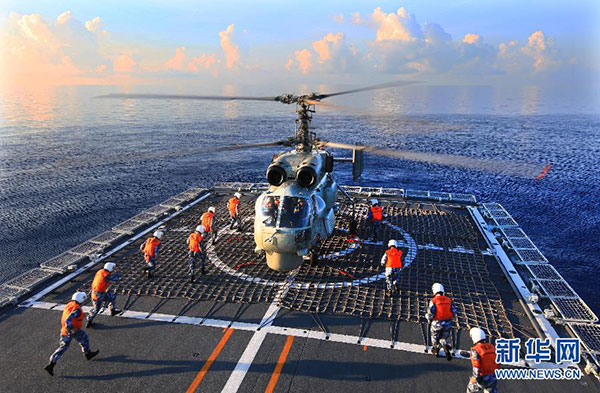

 |
| East China Navy Fleet conducts a training exercise in the South China Sea, in a bid to temper the combat capbility of the troops in complex environment. (Source: Xinhua) |
Annual blue book also includes a reference to 'deep remorse' over war, Kyodo News reports
The Foreign Ministry rebutted on Wednesday the latest Japanese accusation that China had "unilaterally" changed the status quo in the East China Sea.
The accusation is part of a draft of the Japanese government's 2015 foreign policy report, known as the blue book, set to be published by Tokyo. Its contents were revealed by Kyodo News.
"The facts about the Diaoyu Islands are clear," the spokeswoman, Hua Chunying, said. "It is nobody but Japan itself who has taken unilateral measures to change the status quo and create trouble."
The draft also touches on Japanese aggression in the 1930s and 40s. Japan has held to a path of pacifism for 70 years since the end of World War II based on its "deep remorse" over the war, Kyodo quoted the draft as saying.
The move to include the expression "deep remorse" aims to give an impression that the administration of Japanese Prime Minister Shinzo Abe is facing history squarely, Kyodo quoted political pundits as saying.
Hua said the historical issues go to the root of China-Japan relations, and she urged Japan to establish credibility in Asia and the international community with sincere acts.
In the draft report, China is criticized for its continued efforts to "unilaterally change the status quo at sea", while Japan remains determined to protect its territorial sovereignty, including seas and airspace, amid China's maritime "incursions" near the islands in the East China Sea, Kyodo reported.
Tokyo claimed to have "nationalized" part of the Diaoyu Islands in 2012, triggering a deep chill in relations between the two neighbors that resulted in regular patrols of Chinese vessels in waters around the islands.
Hua said China will firmly safeguard its territorial sovereignty as it continues to be committed to controlling and resolving the islands issue through dialogue and negotiation.
She urged Japan to face history squarely, respect facts and make constructive efforts to properly resolve the issue.
Lyu Yaodong, an expert on Japanese policies at the Chinese Academy of Social Sciences, said China's vessels are patrolling their own waters, and Tokyo's allegations about China were aimed at confusing right and wrong.
Japanese Foreign Minister Fumio Kishida is expected to present the report to the Japanese Cabinet next week. It will be translated into English for the first time in nine years, "reflecting the ministry's efforts to offer more information outside Japan", Kyodo said.
The allegations against China in the report will likely sour the relationship, which has not fully recovered despite recent signs of a thaw, Lyu said.
In March, the foreign ministers of China, Japan and South Korea met for the first time in nearly three years. Foreign Minister Wang Yi told his Japanese counterpart that Japan's attitude toward the aggressive war it waged has a direct effect on Tokyo's ties with its neighbors.
 J-11 fighters in air exercise
J-11 fighters in air exercise Beauties dancing on the rings
Beauties dancing on the rings Attendants-to-be join Mr. & Miss Campus Contest
Attendants-to-be join Mr. & Miss Campus Contest Beijing's toughest anti-smoking law takes effect
Beijing's toughest anti-smoking law takes effect Family lives in cave for about 50 years in SW China
Family lives in cave for about 50 years in SW China PLA soldiers operating vehicle-mounted guns in drill
PLA soldiers operating vehicle-mounted guns in drill Blind carpenter in E China's Jiangxi
Blind carpenter in E China's Jiangxi China hosts overseas disaster relief exercise for the first time
China hosts overseas disaster relief exercise for the first time 20 pairs of twins who will become flight attendants in Sichuan
20 pairs of twins who will become flight attendants in Sichuan Obama is sowing discontent in S.China Sea
Obama is sowing discontent in S.China Sea Rescuers work through night to reach cruise ship survivors
Rescuers work through night to reach cruise ship survivors Driving through limbo
Driving through limbo Facing down MERS
Facing down MERSDay|Week